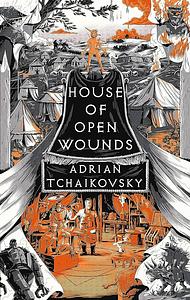Take a photo of a barcode or cover
Magnificent sequel to what was an already magnificent first entry in this series. It's so smartly written, with a sense of wit but also kindness for its characters that reminds me of Terry Pratchett (not in a derivative way!). Whilst the first book felt to me like it had a lot to say about politics happening to and around an individual, this one felt more personal and introspective, with interesting things to say about faith.
Adrian Tchaikovsky is the best contemporary Fantasy & Science Fiction writer of our times, and it is a true privilege to immerse myself in each and every one of his books.
Adrian Tchaikovsky is the best contemporary Fantasy & Science Fiction writer of our times, and it is a true privilege to immerse myself in each and every one of his books.
I love how detailed and tapestry-like this series is, how the narrative folds back over onto itself. Also how the book has such empathy for its characters without shying away from grief and flaws (and allowing the occasional nasty ones to get their satisfying comeuppance). I didn’t enjoy this one quite as much as the first one, but that’s personal preference.
adventurous
dark
funny
slow-paced
Plot or Character Driven:
Character
Strong character development:
Yes
Loveable characters:
Yes
Diverse cast of characters:
Yes
Flaws of characters a main focus:
Yes
dark
mysterious
tense
medium-paced
Plot or Character Driven:
Plot
Strong character development:
Yes
Loveable characters:
No
Diverse cast of characters:
Yes
Flaws of characters a main focus:
Yes
Took me a long time to chip away at this one. More gruesome than the first book. Some of the character and plot twists were very surprising. Hoping the next in the series also shares a character in overlap, as that helped me continue through.
A really solid second book in the series.
Some notes: I didn't like the first book much. Lots of good ideas but a little too scattershot to really grab me. This particular book needs you to wade through the first one in order to make the most of it. The story stands alone... but as much as I didn't like the first one, the world building it does is really important to this novel. If you skipped the first one, I'd wager you'd get the whole "I'm confused and I don't understand" thing that happened to me during the first book but here in the second one. So you might as well read 'em both if this one interests you.
This book is like a fantasy Catch-22 or MASH. It's much more focused than the previous entry (this is a good thing). That being said... it's not as gobsmackingly weird as the first book (which is a mixed thing). All in all, I really enjoyed the more limited scope. I cared more about the characters and had more fun with the occasionally silly bits.
Thematically, I'm not sure we're breaking much ground in the House of Open Wounds. Bureaucracy and warmongering bad. Kindness and peace good but also difficult. Friendship good. War bad. Imagination and curiosity good... etc. BUT this is a fun way to explore it. Hapless as our hero is, he's got a kinda sweet good humor that really shines in a war hospital setting. Grumpy god is a great trope.
I genuinely laughed out loud at a couple points. "Quothe God" had me chuckling every time.
I'm happy to report that the narrator was excellent this time around (same narrator as last book). The marriage between a more focused narration and this particular narrator definitely works. His performance last time (to be very clear) was quite good, but his intensity didn't quite match the meandering of the story and it was difficult to latch onto anything... not a problem in this book. He does an amazing job.
Some notes: I didn't like the first book much. Lots of good ideas but a little too scattershot to really grab me. This particular book needs you to wade through the first one in order to make the most of it. The story stands alone... but as much as I didn't like the first one, the world building it does is really important to this novel. If you skipped the first one, I'd wager you'd get the whole "I'm confused and I don't understand" thing that happened to me during the first book but here in the second one. So you might as well read 'em both if this one interests you.
This book is like a fantasy Catch-22 or MASH. It's much more focused than the previous entry (this is a good thing). That being said... it's not as gobsmackingly weird as the first book (which is a mixed thing). All in all, I really enjoyed the more limited scope. I cared more about the characters and had more fun with the occasionally silly bits.
Thematically, I'm not sure we're breaking much ground in the House of Open Wounds. Bureaucracy and warmongering bad. Kindness and peace good but also difficult. Friendship good. War bad. Imagination and curiosity good... etc. BUT this is a fun way to explore it. Hapless as our hero is, he's got a kinda sweet good humor that really shines in a war hospital setting. Grumpy god is a great trope.
I genuinely laughed out loud at a couple points. "Quothe God" had me chuckling every time.
I'm happy to report that the narrator was excellent this time around (same narrator as last book). The marriage between a more focused narration and this particular narrator definitely works. His performance last time (to be very clear) was quite good, but his intensity didn't quite match the meandering of the story and it was difficult to latch onto anything... not a problem in this book. He does an amazing job.
adventurous
emotional
funny
hopeful
tense
medium-paced
Plot or Character Driven:
A mix
Strong character development:
Yes
Loveable characters:
Yes
Diverse cast of characters:
Yes
medium-paced
Plot or Character Driven:
A mix
Strong character development:
Yes
Loveable characters:
Complicated
Diverse cast of characters:
Yes
oh my god this was so much better than city of last chances. oh my god i did not expect to say that when i first started this book but i LOVE how the author took the original conceit of yasnic's religion and writ it SO large after having it only apply to one character in the first book. LOVE the characters (banders, my heart), love their interactions (everyone cares for each other so much despite not having any reason to!!!), love how much more real this made the whole world feel.
house of open wounds is a direct foil to city of last chances, somehow. the scale is smaller (a single hospital tent) and larger (half a continent, armies clashing rather than rebels and colonisers in a single city) at the same time. this feels so much more character and relationship driven - this is not the story of how individuals are buffeted around by chance and circumstance, but rather how they can take agency into their own hands despite the hand they've been dealt. it is, of course, more of a critique of war than colonial imperialism, of course, but i appreciate that tchaikovsky doesn't tell the same thing twice.
i also quite like the way magic is treated in this one compared to city of last chances - the setting is far from mystical for anyone involved, and every magic element (the gods, the tablethi, alv's whatever the hell she has going on) seems so much more grounded, as if i could accept that we had that in our own world too.
quite literally my only problem w this book is that i do feel you have to read city of last chances first and it's simply not as good!!!!
house of open wounds is a direct foil to city of last chances, somehow. the scale is smaller (a single hospital tent) and larger (half a continent, armies clashing rather than rebels and colonisers in a single city) at the same time. this feels so much more character and relationship driven - this is not the story of how individuals are buffeted around by chance and circumstance, but rather how they can take agency into their own hands despite the hand they've been dealt. it is, of course, more of a critique of war than colonial imperialism, of course, but i appreciate that tchaikovsky doesn't tell the same thing twice.
i also quite like the way magic is treated in this one compared to city of last chances - the setting is far from mystical for anyone involved, and every magic element (the gods, the tablethi, alv's whatever the hell she has going on) seems so much more grounded, as if i could accept that we had that in our own world too.
quite literally my only problem w this book is that i do feel you have to read city of last chances first and it's simply not as good!!!!
Rating: 4.5 Stars
And we're back with the Palleseen sway, this time as part of their advancing army on their quest to extend their Perfection across the entire world. But, for a novel of war, we're not on the frontlines as a soldier, but instead in the front lines hospital tent, as part of an experimental group that defies ordinary rules of Pal doctrine of Perfection in service of the greater good that includes a character from the first book, Yasnic (or Maric Jack as he comes to be called here), and the hodge podge others with an ability to heal.
Ultimately, what you get is a book that ruminates on war, and specifically the violence of it. The lives lost, the callousness of forward momentum, the cost paid in the blood and ability of those lower down on the food chain by those orders sent from up high, and even how anything can be twisted into weapons by those who have a mind to do so. This is a bloody book, where the opening chapter calls the hospital tent "Hell" so convincingly that I was, for a moment, truly thinking that there was a portal to Hell on this frontline and the soldiers of the Palleseen army were being tended to by demons. Admittedly, this particular series has Hell and demons both, so it was certainly possible, but it almost hits further when you realise that though the name is not literal, it might as well be.
The flaws from City of Last Chances - notably the many rotating POVs and flurry of information that comes at you thick and fast - are much reduced here. The cast is smaller, and more concerned with the field hospital specifically, so it gives you more chance to get acquainted with the names and used to them. It's easier to parse, basically. The characters aren't always great, in fact, most of them would be villains in some other story, but as it is, these are your protagonists, and in the shadows of the Pal army, you are still rooting for them, because they are lesser evils than the ones ordering them to do greater damage. Unlike Ilmar, which we left with a lot of unexplored mysteries, this book does better to wrap itself into a neater conclusion. Not quite a full ending, but a satisfactory one that left me feeling even a little hopeful for the world, for just a short period of time.
I devoured this book, and I loved the magic and the cruelty on display, being displayed exactly as cruel as it is. There is not a held punch here, you feel the injustice and the pain and torment. That's not to say that there wasn't some flaws. Some aspects I did take a little double look at it. For example, Yasnic develops a new relationship, but I didn't necessarily buy the strength of his feeling from the scenes I was shown, not to the breadth that they actually changed him. Similarly, there's a character called Banders, who has a surprising connection to another smaller character, to which I felt was slightly all too convenient. Explainable, yes, but perhaps, not quite as easy to swallow as it was meant to be. But for all that, I enjoyed the crap out of this book. I wonder if we will see any of these characters again in future novels, and though the answer is probably no, that does sadden me, because I enjoyed them.
In all, once again, a hell of a book, with strange magic, a world brimming with ideas, and a core that examines the full horror of war and trying to survive it.
And we're back with the Palleseen sway, this time as part of their advancing army on their quest to extend their Perfection across the entire world. But, for a novel of war, we're not on the frontlines as a soldier, but instead in the front lines hospital tent, as part of an experimental group that defies ordinary rules of Pal doctrine of Perfection in service of the greater good that includes a character from the first book, Yasnic (or Maric Jack as he comes to be called here), and the hodge podge others with an ability to heal.
Ultimately, what you get is a book that ruminates on war, and specifically the violence of it. The lives lost, the callousness of forward momentum, the cost paid in the blood and ability of those lower down on the food chain by those orders sent from up high, and even how anything can be twisted into weapons by those who have a mind to do so. This is a bloody book, where the opening chapter calls the hospital tent "Hell" so convincingly that I was, for a moment, truly thinking that there was a portal to Hell on this frontline and the soldiers of the Palleseen army were being tended to by demons. Admittedly, this particular series has Hell and demons both, so it was certainly possible, but it almost hits further when you realise that though the name is not literal, it might as well be.
The flaws from City of Last Chances - notably the many rotating POVs and flurry of information that comes at you thick and fast - are much reduced here. The cast is smaller, and more concerned with the field hospital specifically, so it gives you more chance to get acquainted with the names and used to them. It's easier to parse, basically. The characters aren't always great, in fact, most of them would be villains in some other story, but as it is, these are your protagonists, and in the shadows of the Pal army, you are still rooting for them, because they are lesser evils than the ones ordering them to do greater damage. Unlike Ilmar, which we left with a lot of unexplored mysteries, this book does better to wrap itself into a neater conclusion. Not quite a full ending, but a satisfactory one that left me feeling even a little hopeful for the world, for just a short period of time.
I devoured this book, and I loved the magic and the cruelty on display, being displayed exactly as cruel as it is. There is not a held punch here, you feel the injustice and the pain and torment. That's not to say that there wasn't some flaws. Some aspects I did take a little double look at it. For example, Yasnic develops a new relationship, but I didn't necessarily buy the strength of his feeling from the scenes I was shown, not to the breadth that they actually changed him. Similarly, there's a character called Banders, who has a surprising connection to another smaller character, to which I felt was slightly all too convenient. Explainable, yes, but perhaps, not quite as easy to swallow as it was meant to be. But for all that, I enjoyed the crap out of this book. I wonder if we will see any of these characters again in future novels, and though the answer is probably no, that does sadden me, because I enjoyed them.
In all, once again, a hell of a book, with strange magic, a world brimming with ideas, and a core that examines the full horror of war and trying to survive it.
funny
lighthearted
slow-paced







